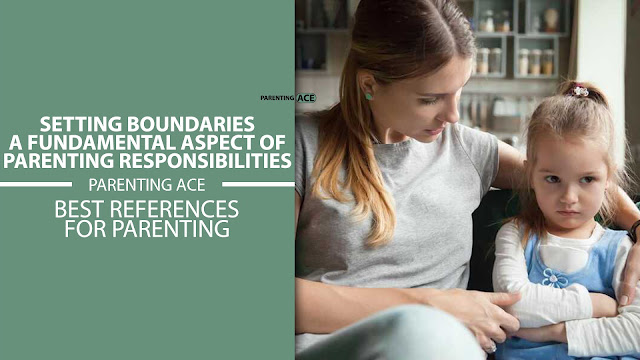Setting Boundaries: A Fundamental Aspect of Parenting Responsibilities
Welcome to our latest blog post where we delve into the vital realm of setting boundaries within the context of parenting. As one of the fundamental responsibilities of nurturing a child, setting boundaries plays a pivotal role in guiding their development and shaping their understanding of personal responsibility. In this article, we explore the significance of boundaries in fostering healthy parent-child dynamics, the nuanced strategies involved, and the profound impact they have on children's emotional and social well-being. Join us as we embark on a journey to understand the importance of boundaries in the intricate tapestry of parenting.
 |
| Setting Boundaries: A Fundamental Aspect of Parenting Responsibilities |
Parenting entails a myriad of responsibilities, each crucial for fostering a child's holistic development. Among these responsibilities, setting boundaries emerges as a cornerstone, shaping a child's understanding of norms, limits, and personal responsibility. In this article, we delve into the significance of setting boundaries within the scope of understanding parenting, exploring its impact on children's growth and the effective strategies parents can employ.
The Importance of Setting Boundaries
Boundaries serve as guidelines that delineate acceptable behavior, interactions, and responsibilities within the family and society. By establishing clear boundaries, parents provide children with a sense of security, structure, and predictability, essential for their emotional and social well-being. Boundaries also cultivate self-discipline, resilience, and respect for others, laying the groundwork for healthy relationships and positive life outcomes.
Understanding Developmental Needs
Effective boundary-setting requires an understanding of children's developmental stages and individual needs. Toddlers, for instance, thrive with consistent routines and simple rules to navigate their burgeoning independence. As children grow, boundaries evolve to accommodate their expanding cognitive abilities and social interactions, necessitating open communication and negotiation. Adolescents, grappling with autonomy and peer influence, benefit from boundaries that balance freedom with accountability, fostering self-regulation and decision-making skills.
Communication and Consistency
Central to setting boundaries is clear and consistent communication. Parents should articulate expectations, consequences, and reasoning behind boundaries in age-appropriate language, fostering understanding and cooperation. Consistency reinforces the validity of boundaries, establishing trust and predictability in parent-child dynamics. Moreover, parents must lead by example, demonstrating respect for boundaries and modeling healthy conflict resolution strategies.
Flexibility and Adaptation
While consistency is vital, flexibility is equally essential in boundary-setting. Parents should remain attuned to their child's evolving needs, adjusting boundaries accordingly. Flexibility allows for individual differences, recognizing that what works for one child may not be suitable for another. Moreover, parents should be open to renegotiating boundaries as children demonstrate maturity and responsibility, fostering autonomy and self-reliance.
Empathy and Support
Setting boundaries does not equate to authoritarianism; it necessitates empathy and support. Parents should validate their child's emotions and perspective, fostering a collaborative approach to boundary-setting. By empathizing with their child's struggles and offering guidance, parents cultivate trust and strengthen the parent-child bond. Additionally, providing support structures, such as encouragement, problem-solving strategies, and emotional validation, reinforces children's capacity to navigate and respect boundaries effectively.
In the intricate tapestry of parenting responsibilities, setting boundaries emerges as a foundational element, shaping children's development and fostering healthy relationships. By understanding the significance of boundaries within the scope of understanding parenting, parents can navigate this terrain with clarity, empathy, and purpose, empowering their children to thrive in a world guided by respect, responsibility, and resilience.



Comments
Post a Comment